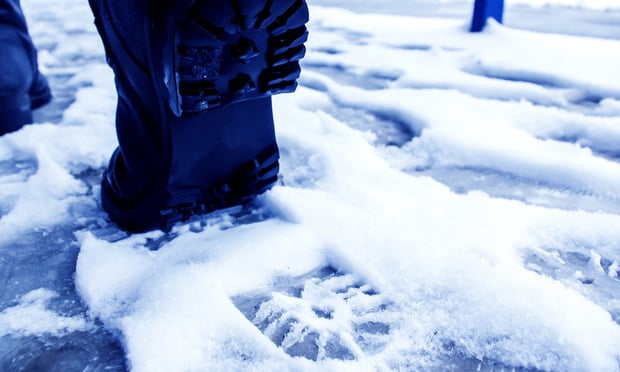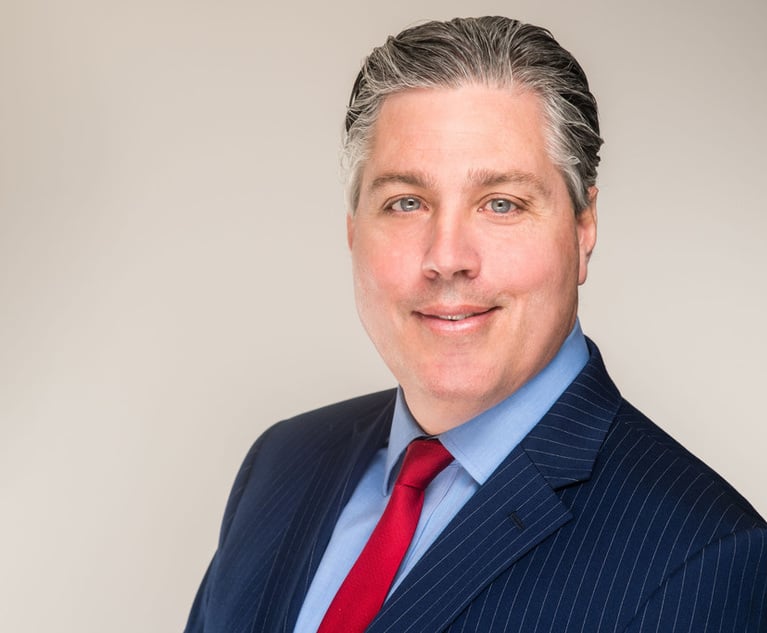Justices to Review Dismissal of Claims Over Snow Tubing Injury
The Pennsylvania Supreme Court has agreed to take up an appeal by a man who claims injuries he suffered while snow tubing were the result of negligence and recklessness on the part of the tube run operator.
June 27, 2019 at 10:49 AM
5 minute read
 Photo: Shutterstock.com
Photo: Shutterstock.com
The Pennsylvania Supreme Court has agreed to take up an appeal by a man who claims injuries he suffered while snow tubing were the result of negligence and recklessness on the part of the tube run operator.
A three-judge Superior Court panel ruled 2-1 last year to uphold a York County trial court's grant of summary judgment to defendants Snow Time and Ski Roundtop Operating Corp. In a June 25 order, the Supreme Court granted allocatur in the case.
Plaintiff Ray Bourgeois was seriously injured when his tube crossed paths with the rubber kitchen mats placed at the bottom of the tube run, according to the court's Aug. 14 opinion. He and his wife subsequently sued Snow Time and Ski Roundtop, alleging that they were reckless and grossly negligent in using rolled-up kitchen mats to help slow down riders at the bottom of the hill.
The plaintiffs submitted expert reports by Mark DiNola, an expert in the field of ski and snow tubing risk management, and Gordon Moskowitz, a mechanical and biomechanical engineering expert.
But Judge Alice Beck Dubow, writing for the majority, said neither report specifically established that the defendants breached a standard of care by placing rubber mats at the bottom of the tube run.
Dubow said DiNola's report discussed the standard of care set forth in the National Ski Areas Association's “Tubing and Operations Resource Guide,” which only addresses the length of a tubing run-out, not the use of mats to aid in deceleration. Moskowitz, meanwhile, did not set forth any standards of care for tube run operators, Dubow added.
“Therefore, we are constrained to agree with the trial court that appellants failed to articulate the appropriate standard of care for the use of deceleration mats,” said Dubow, joined by Judge Paula Francisco Ott. “Without such a standard of care, appellants, as a matter of law, cannot establish appellees' duty to appellants and that appellees knew or should have known about the standard of care.”
But Senior Judge Eugene B. Strassburger III filed a dissent, arguing that a reasonable jury could find that repurposing kitchen mats as deceleration devices constituted gross negligence and/or recklessness on the part of the defendants.
“One cannot seriously dispute that appellees owe their patrons, who are riding on a vinyl tube without a steering or stopping mechanism down a steep snow-covered hill on a course that appellees designed, a duty to ensure that the patrons are able to stop safely without serious injury at the bottom,” Strassburger said. ”One hardly needs an expert to establish that placing a stationary object, which is designed for an entirely different use, in the path of a fast-travelling snow tube rider in the hopes of slowing down the rider could instead, under certain foreseeable conditions, cause the rider to stop abruptly and eject the rider in a manner resulting in serious injury.”
Strassburger also argued that the trial court's opinion granting summary judgment to the defendants made no mention of the plaintiffs' expert reports.
“The majority simply ignores the trial court's failure to consider appellants' expert reports and undergoes its own analysis of the reports,” Strassburger said.
The plaintiffs had also argued that the trial court improperly considered testimony from the defendants' employees that they were not aware of the dangers of using kitchen mats as deceleration devices, in violation of the 1932 state Supreme Court ruling in Borough of Nanty-Glo v. American Surety Co. of New York.
But Dubow said Nanty-Glo requires a trial court to first decide whether the plaintiffs established a prima facie case. In this case, the trial court found that the plaintiffs did not.
Dubow also rejected the plaintiffs' challenge to the trial court's dismissal of the negligence claim against Snow Time based on a release Bourgeois signed.
The plaintiffs had argued that the release only specifically named Ski Roundtop, not Snow Time. But Dubow said it is undisputed that Snow Time owns Ski Roundtop.
“Although the release does not specifically name appellee Snow Time Inc., the release still covers appellee Snow Time, Inc. because the release clearly and unambiguously covers the owner of Ski Roundtop Operating Corp.,” Dubow said.
In its June 25 order granting allocatur, the Supreme Court agreed to consider four issues on appeal:
“(1) Did the majority panel opinion conflict with existing law by failing to address the trial court's disregard of petitioners' expert reports when granting summary judgment?
(2) Did the majority panel opinion conflict with existing law requiring it to review petitioners' expert reports in the light most favorable to the non-moving party by, inter alia, (a) improperly requiring petitioners' experts to establish the legal duty that respondents breached, (b) dismissing their opinions as conclusory, and (c) overlooking numerous opinions throughout their reports which supported petitioners' prima facie case against respondents?
(3) Did the majority panel opinion conflict with existing law when it held that petitioners did not establish the duties respondents owed to petitioners, when the duty of a snow tubing facility to protect its patrons from unreasonable risks of harm has already been established by the Supreme Court in Tayar v. Camelback?
(4) Did the majority panel opinion conflict with existing law by requiring that a violation of industry standards be demonstrated for petitioners to sustain a recklessness or gross negligence cause of action against respondents?”
Counsel for Bourgeois, Michael Malvey of Galfand Berger in Philadelphia, could not be reached for comment. Counsel for the defendants, Anthony Hinkle of Cipriani & Werner in Blue Bell, also could not be reached.
This content has been archived. It is available through our partners, LexisNexis® and Bloomberg Law.
To view this content, please continue to their sites.
Not a Lexis Subscriber?
Subscribe Now
Not a Bloomberg Law Subscriber?
Subscribe Now
NOT FOR REPRINT
© 2025 ALM Global, LLC, All Rights Reserved. Request academic re-use from www.copyright.com. All other uses, submit a request to [email protected]. For more information visit Asset & Logo Licensing.
You Might Like
View All
Saul Ewing Loses Two Partners to Fox Rothschild, Marking Four Fla. Partner Exits in Last 13 Months
3 minute read


Feasting, Pledging, and Wagering, Philly Attorneys Prepare for Super Bowl
3 minute readTrending Stories
- 1States Accuse Trump of Thwarting Court's Funding Restoration Order
- 2Microsoft Becomes Latest Tech Company to Face Claims of Stealing Marketing Commissions From Influencers
- 3Coral Gables Attorney Busted for Stalking Lawyer
- 4Trump's DOJ Delays Releasing Jan. 6 FBI Agents List Under Consent Order
- 5Securities Report Says That 2024 Settlements Passed a Total of $5.2B
Who Got The Work
J. Brugh Lower of Gibbons has entered an appearance for industrial equipment supplier Devco Corporation in a pending trademark infringement lawsuit. The suit, accusing the defendant of selling knock-off Graco products, was filed Dec. 18 in New Jersey District Court by Rivkin Radler on behalf of Graco Inc. and Graco Minnesota. The case, assigned to U.S. District Judge Zahid N. Quraishi, is 3:24-cv-11294, Graco Inc. et al v. Devco Corporation.
Who Got The Work
Rebecca Maller-Stein and Kent A. Yalowitz of Arnold & Porter Kaye Scholer have entered their appearances for Hanaco Venture Capital and its executives, Lior Prosor and David Frankel, in a pending securities lawsuit. The action, filed on Dec. 24 in New York Southern District Court by Zell, Aron & Co. on behalf of Goldeneye Advisors, accuses the defendants of negligently and fraudulently managing the plaintiff's $1 million investment. The case, assigned to U.S. District Judge Vernon S. Broderick, is 1:24-cv-09918, Goldeneye Advisors, LLC v. Hanaco Venture Capital, Ltd. et al.
Who Got The Work
Attorneys from A&O Shearman has stepped in as defense counsel for Toronto-Dominion Bank and other defendants in a pending securities class action. The suit, filed Dec. 11 in New York Southern District Court by Bleichmar Fonti & Auld, accuses the defendants of concealing the bank's 'pervasive' deficiencies in regards to its compliance with the Bank Secrecy Act and the quality of its anti-money laundering controls. The case, assigned to U.S. District Judge Arun Subramanian, is 1:24-cv-09445, Gonzalez v. The Toronto-Dominion Bank et al.
Who Got The Work
Crown Castle International, a Pennsylvania company providing shared communications infrastructure, has turned to Luke D. Wolf of Gordon Rees Scully Mansukhani to fend off a pending breach-of-contract lawsuit. The court action, filed Nov. 25 in Michigan Eastern District Court by Hooper Hathaway PC on behalf of The Town Residences LLC, accuses Crown Castle of failing to transfer approximately $30,000 in utility payments from T-Mobile in breach of a roof-top lease and assignment agreement. The case, assigned to U.S. District Judge Susan K. Declercq, is 2:24-cv-13131, The Town Residences LLC v. T-Mobile US, Inc. et al.
Who Got The Work
Wilfred P. Coronato and Daniel M. Schwartz of McCarter & English have stepped in as defense counsel to Electrolux Home Products Inc. in a pending product liability lawsuit. The court action, filed Nov. 26 in New York Eastern District Court by Poulos Lopiccolo PC and Nagel Rice LLP on behalf of David Stern, alleges that the defendant's refrigerators’ drawers and shelving repeatedly break and fall apart within months after purchase. The case, assigned to U.S. District Judge Joan M. Azrack, is 2:24-cv-08204, Stern v. Electrolux Home Products, Inc.
Featured Firms
Law Offices of Gary Martin Hays & Associates, P.C.
(470) 294-1674
Law Offices of Mark E. Salomone
(857) 444-6468
Smith & Hassler
(713) 739-1250





